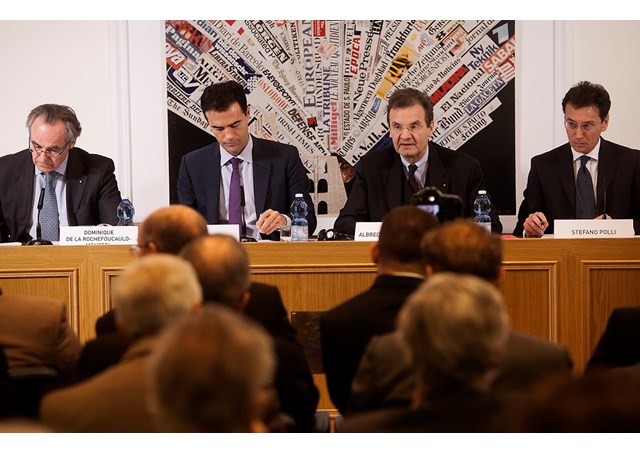
Order of Malta faces up to realities of refugee crisis

(Vatican Radio) In preparation for the World Humanitarian Summit in Istanbul in 2016, officials from the Order of Malta held a press conference in Rome on Wednesday, entitled ‘People fleeing from war: aid, assistance, integration’ (Popoli in fuga dalla guerra: soccorso, assistenza, integrazione).
The Grand Chancellor of the Order of Malta, Albrecht Boeselager began the conference by describing the horrific plight faced by over 700,000 refugees fleeing from war this year. The situation becomes “more desperate by the hour… doors are closed, walls are erected”. He went on to quote several statistics, the most shocking of which was that one in four refugees is a child. He also mentioned that as winter approaches, the young and the elderly risk contracting diseases such as pneumonia.
Bramble Badenach-Nicolson spoke with Mr Boeselager about the current crisis and the Order of Malta’s all-important role.
Listen here:
The Grand Chancellor explained how the Order is running operations in countries of origin, transit and recipient nations. He describes a “perilous journey” in which migrants will be exposed to trafficking; women are often subjected to rape and forced prostitution while men are victims of slave labour. “They will risk their life three or four times”.
For those the majority of us, it is hard to understand why these people would wish to take such an enormous risk, travelling from the Middle East to Europe; we might even question whether it is worth the trouble. Boeselager said “it is not up to us to judge”. He recalled a refugee he met recently whose boat sank en route from Turkey to Greece; 80 percent of his fellow travelers died. He was rescued, but decided to take the next boat, three hours later; “yes, they think it’s worth it”.
Oliver McTernan, Director of Forward Thinking, was also present at the conference and suggested that organisations such as the Order of Malta ought to be less reactive and more proactive in circumstances such as these. Mr Boeselager responded to this saying that the Order seeks to encourage international communities to provide more resources: “if they could help people on the spot, they wouldn’t move to Europe”.
Ingo Radtke, Secretary General of Malteser Interational, the worldwide relief agency of the Order of Malta later outlined the extent of the Order’s humanitarian work in the Middle East. With the help of 80,000 volunteers and 25,000 employees, the organization aims to deliver medical assistance and relief from trauma and further their 900-year old aim to help the most needy.
Radtke explained how, every day, thousands of helpers risk their lives. They “act as a curtain”, he said: if there is a safety breach, they are given a 45 minutes to get out of Syria. When the threat subsides, they move back in, like a curtain wafts in a breeze. Radtke said the situation had become so fragile that volunteers must “think like the military… judge the situation from day to day”. So precarious are the circumstances that medical operatives have been forced to produce oxygen during an operation, rather than transporting it with them, ready-made.
Mr Radtke made a salient point, one which we all ought to heed: "if the 60 million refugees in the world were to come together, they would form the 25th largest nation on the planet". Their voices must be heard and their needs must be met.
| All the contents on this site are copyrighted ©. |


